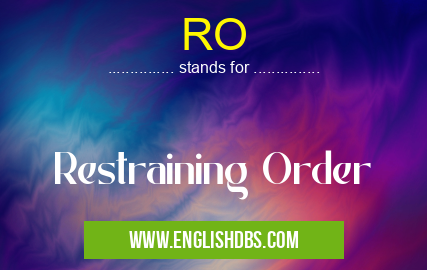What does RO mean in POLICE
Restraining Order (RO) is an official document issued by a court that orders someone to refrain from specific activities or to stay away from certain individuals. Such orders are typically used when the court believes that an individual has exhibited threatening behavior, which could lead to harassment or other dangerous activities. Restraining orders can be both civil and criminal in nature. They often come into play in family court disputes, such as cases involving divorce and domestic abuse. Knowing what RO means and how it works is essential for any individual involved in a restraining order dispute.

RO meaning in Police in Governmental
RO mostly used in an acronym Police in Category Governmental that means Restraining Order
Shorthand: RO,
Full Form: Restraining Order
For more information of "Restraining Order", see the section below.
» Governmental » Police
Essential Questions and Answers on Restraining Order in "GOVERNMENTAL»POLICE"
What is a restraining order?
A restraining order, also known as a protective order, is a court-issued document which orders an individual to stay away from and refrain from contact with another person. The court may also issue other orders, such as requiring the respondent to pay child support or stay away from the petitioner's place of work.
How do I get a restraining order?
To obtain a restraining order, you must go to your local courthouse and file a petition for protection. Depending on your jurisdiction, you may be able to do this yourself without an attorney or you may need to consult with an attorney in order to get one.
What type of behaviors does a restraining order cover?
A restraining order can include any behavior that constitutes harassment or interference with the safety and well-being of another person. This can include stalking, threatening phone calls or text messages, physical violence, or even indirect threats such as posting public information about an individual online.
Are there different types of restraining orders?
Yes. The most common type of restraining order is called an emergency protective order (EPO). This type of order lasts only 72 hours but can be extended if necessary. There are also temporary and permanent protective orders which last for longer periods of time depending on the circumstances.
What happens if someone violates a restraining order?
Violating a restraining order is considered a criminal act and can lead to arrest by the police in most jurisdictions. Depending on the severity of the offense, violators may face jail time and/or fines. Additionally, repeat offenders may be subject to further penalties such as increased fines or longer jail sentences.
Is it possible to have a restraining order lifted?
In some jurisdictions it is possible to have an existing protective order lifted if it has been determined that it is no longer needed due to changes in circumstances. However, this process varies greatly between jurisdictions and generally requires filing additional paperwork with the court that granted the original protective order.
Does a victim have any legal recourse if they feel their protective order was violated?
Victims who believe their protective orders have been violated can file criminal charges against the offender if they choose. Additionally, victims can also pursue civil damages against violators through small claims court for acts such as property damage or loss wages due to missed work caused by violation.
Is there financial assistance available for victims who cannot afford legal representation when pursuing a protection from abuse (PFA) case?
In some cases financial assistance may be available through Victim Witness Programs run by local law enforcement agencies or state Attorney General's offices in certain jurisdictions.
Can I obtain a copy of my own personal protection from abuse (PFA) Order?
Yes, individuals who are issued PFA Orders are entitled to receive copies free of charge upon request from either their local courthouse or their local police department where they filed the original paperwork.
Final Words:
In conclusion, Restraining Orders (RO) are legally binding documents widely used in both civil and criminal cases involving unsafe behavior or threats posed against another person’s safety and well-being. These official documents require adherence to all of their conditions lest one risks facing serious penalties both civil and criminal in nature. Knowing what RO means and how it works will provide greater understanding for anyone involved in such matters either directly or indirectly.
RO also stands for: |
|
| All stands for RO |
